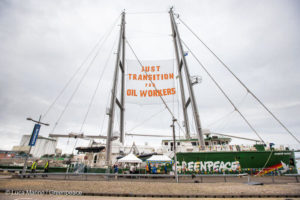Build the climate movement – welcome to ecosocialist.scot!
With less than 100 days to go to the United Nations Climate Conference COP26 in Glasgow, action is being stepped up across Scotland to demand governments respond effectively to the challenge of climate change.

Inspired by Greta Thurnberg’s school strike for climate movement, Fridays for the Future school students held a protest in Glasgow on the final day of the Scottish school year in June. July saw an occupation of the UK Government building in Edinburgh by activists from Extinction Rebellion and Friends of the Earth Scotland to oppose the UK government’s proposed licencing of a new Scottish oilfield, Cambo, off the shores of Shetland. Greenpeace organised for the iconic Rainbow Warrior ship to protest against the existing oil and gas facilities in North East Scotland, with the demand for a Just Transition for workers at the centre of the action. Climate Camp Scotland activists gathered at the Mossmorran plant in Fife to demand the closure of one of Scotland’s largest contributors to carbon emissions and pollution by the Scottish government and it’s toothless Scottish Environmental Protection Agency (SEPA).
Across all these campaigns, it is significant that young people in particular are at the centre of the actions, and that they are demanding workers rights, a just transition, and organising with local communities to put demands on government.

Further action will follow in August and September as we near COP26. A Scottish ‘Climate Fringe Week‘ takes place 18-26 September with protest meetings and events across the country, culminating in a protest action on the theme of ‘Peace and Climate’ on Sunday 26 September, the International Day of action against Nuclear Weapons, at the Faslane military base near Glasgow – home of the UK’s hated nuclear weapons’ system Trident. Young activists in Fridays for the Future are also discussing a global massive school strike on Friday 17 September [NB we understand this will now be 24 September – note added 5 Aug].
In November, when the COP26 delegates arrive in Glasgow from the governments of the world, they will face a massive protest march in Glasgow on Saturday 6 November, with synchronised marches in London and elsewhere in Britain and across the world. Friday 5 November will be not just a school strike but an encouragement for a global day of industrial action around climate, though realistically this is not likely to be a widespread general strike. A “Peoples Summit” on the climate crisis will take place from 7-9 November, both in Glasgow and online to enable participation globally.
The COP26 Coalition is uniting environmental and political campaigns around the UK and globally in a broad-based movement to support the need for action at the COP26 in Glasgow, and will be organising many events
Severe Weather
The target of all these protests before and at the COP is the need for governmental action in the face of the increasingly severe weather events across the globe during 2021 – we have seen floods killing 100s in Europe, heat waves in north America, floods in China, fires in Australia and elsewhere, as the world faces rising temperatures and the consequences of a human-made climate crisis.
For decades, governments and establishment politicians have tried to claim that this is not happening or can be managed within existing policies. Now even the UK’s Meteorological Office has produced damning evidence of the real impact of climate change in Britain. But politicians are still trying to peddle the illusion of ‘Net Zero’ – they advocate carrying on with producing carbon and putting off dealing with the problem to tomorrow, with the false promise of technologies that don’t exist yet or that can never be delivered.
Global capitalism is anxious to maintain its profits and exploitation even if it risks destroying the entire planet. False solutions of ‘offsetting’ and proclaiming future Carbon Capture & Storage technologiesa re being used to promote the ‘Big Con‘ of Net Zero, in reality putting necessary action off until ‘tomorrow’ while continuing with excessive carbon emissions today. The solutions for ‘Real Zero’ are clear and have been known for decades: leave fossil fuels in the ground and switch rapidly and entirely to renewable energy to limit global temperature rises, stop producing waste and pollution by transforming production and usage of goods, create a just transition for workers, support the global south from the riches of the north, transform the global economy to one with environmental responsibility to nature at its core.
Two Governments Failing
In Scotland, we have two governments apparently giving somewhat different messages. But both the SNP Scottish government and the Tory UK government are failing to live up to the challenges of the climate crisis.
The Tory UK government, host of the COP26, wants to pretend that it is a ‘global leader’ in tackling climate change. The reality is very different, with the Tories backing fully their big business interests, for example expanding oil and gas extraction and even contemplating opening new coal and oil fields rather than shutting down the existing ones with full protection for workers jobs.

Despite their greenwashing, the SNP have long been backers of ‘Scotland’s Oil’ and their conferences are bedecked with big business sponsorship from aviation and oil interests. The Scottish government have published their own contribution to the Paris Agreement in the form of a ‘Indicative NDC’ [1]. But despite the constitutional limitations of the current devolution arrangements, this still falls way short of the mark with a widespread failure to tackle adequately the areas of a just transition for oil and gas workers, roadbuilding, delivery of free public transport based on renewable energy, retrofitting homes, closing down polluters like the Mossmorran plant, reduction of the aviation industry, agriculture and many other areas.
The Scottish Green Party and some in Labour have rightly spoken out against the inadequacies of the SNP, but there is also a danger of the Scottish Greens going the way of their German counterparts and in their haste to join government, risking compromising on their principles and the needs of the situation. The Labour Party under its new Starmer leadership seems to want to just follow Tory policies in the face of the crisis and not build on the Green New Deal promised by the previous Corbyn leadership.

Faced with the dislocation caused by a global pandemic, it is clear that the world and humankind need to ‘build back’ in a totally different way – one that respects nature and puts people and planet first. This means a direct challenge to capitalism and its institutions. But the alternative we need is not some reversion to the failed 20th century ‘communism’ or ‘socialism’ of the Stalinist or social democratic type. Nor do we just stand around talking about how we cannot do anything permanently until ‘the revolution comes’.
Ecosocialism
What is needed is ‘ecosocialism‘ – bringing new thinking to the radical movement, both about the future and about the here and now … we need to have a vision for the future of a planet freed from capitalist exploitation and misery through ‘system change not climate change’, while at the same time building mass movements that can demand action from governments and win united support across the globe especially from young people who have most at stake. It’s a massive task but one that holds the future of the planet in its grasp.

Why ecosocialist.scot?
ecosocialist.scot is an initiative of an existing group of revolutionary ecosocialists and supporters of the Fourth International, who feel the need to put a distinctive view forward in the current crises in Scotland.
We will attempt to bring a modest contribution to filling the need for ecosocialist ideas with articles, often with a specific Scottish focus, about the global climate crisis, what ecosocialism means, and the battle against the exploitation of workers and championing the liberation of the oppressed. We will also put forward ideas about ways forward for both the environmental and workers movements in Scotland, and for the democratic right of the Scottish people for self-determination and independence. We support both the existing COP26 Coalition and the building of an anti-capitalist wing of the environmental movement to challenge governments across the world and put forward radical alternatives.
As Scotland moves centre stage with the COP26, we hope that readers of ecosocialist.scot, in Scotland and around the world, will follow us, contribute ideas and join us in building a better … and ecosocialist … future! We look forward to meeting you in Glasgow in November 2021.